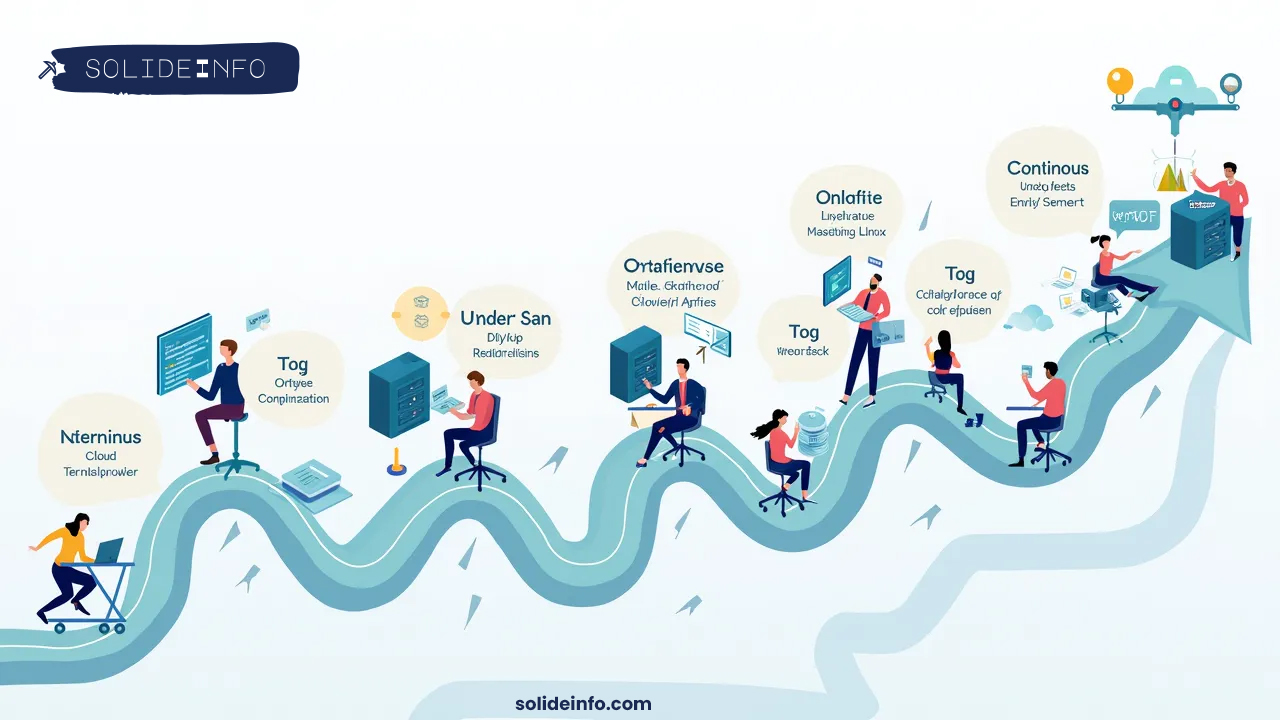Are you ready to embark on an exciting journey into the world of DevOps? 🚀 In today’s fast-paced tech landscape, DevOps engineers are the unsung heroes bridging the gap between development and operations. Their role is crucial in streamlining processes, enhancing collaboration, and driving innovation within organizations.
But here’s the burning question: How does one become a successful DevOps engineer? 🤔 Whether you’re a curious beginner or a seasoned IT professional looking to pivot, the path to DevOps mastery can seem daunting. Fear not! This comprehensive guide will walk you through the essential steps, skills, and strategies needed to excel in this dynamic field.
From understanding the core principles of DevOps to mastering cutting-edge tools and technologies, we’ll cover it all. Get ready to dive deep into the realms of automation, configuration management, security, and more. Along the way, we’ll also explore the often-overlooked soft skills that can make or break your DevOps career. So, buckle up as we embark on this transformative journey to becoming a DevOps engineer extraordinaire!
Understanding DevOps Fundamentals
A. Defining DevOps and its importance
DevOps is a set of practices that combines software development (Dev) and IT operations (Ops) to shorten the systems development life cycle while delivering features, fixes, and updates frequently in close alignment with business objectives. It’s not just a methodology, but a culture that emphasizes collaboration, automation, and continuous improvement.
The importance of DevOps lies in its ability to:
- Accelerate time-to-market
- Improve product quality
- Enhance customer satisfaction
- Increase operational efficiency
B. Benefits of implementing DevOps practices
Implementing DevOps practices can lead to significant improvements in various aspects of software development and IT operations:
| Benefit | Description |
|---|---|
| Faster delivery | Automated processes and continuous integration/delivery pipelines speed up release cycles |
| Higher quality | Early bug detection and continuous testing lead to more stable and reliable software |
| Improved collaboration | Breaking down silos between development and operations teams fosters better communication |
| Increased efficiency | Automation of repetitive tasks allows teams to focus on high-value activities |
| Enhanced security | Integrating security practices throughout the development lifecycle (DevSecOps) improves overall system security |
C. DevOps culture and mindset
At its core, DevOps is about fostering a culture of collaboration, transparency, and shared responsibility. This culture is characterized by:
- Cross-functional teams
- Shared ownership of outcomes
- Continuous learning and experimentation
- Embracing failure as a learning opportunity
- Focus on customer value
D. Key principles of DevOps
The foundational principles of DevOps include:
- Continuous Integration and Continuous Delivery (CI/CD)
- Infrastructure as Code (IaC)
- Microservices architecture
- Automated testing and monitoring
- Collaborative problem-solving
These principles guide organizations in implementing DevOps practices effectively, leading to more efficient and reliable software delivery processes. As we move forward, we’ll explore the essential technical skills that DevOps engineers need to master to put these principles into practice.
Essential Technical Skills for DevOps Engineers
Now that we’ve covered the fundamentals of DevOps, let’s dive into the essential technical skills every aspiring DevOps engineer should master. These skills form the backbone of DevOps practices and are crucial for success in this field.
A. Cloud Platforms and Services
Cloud computing is at the heart of modern DevOps practices. Familiarity with major cloud platforms is essential:
- Amazon Web Services (AWS)
- Microsoft Azure
- Google Cloud Platform (GCP)
| Cloud Platform | Key Services |
|---|---|
| AWS | EC2, S3, Lambda |
| Azure | Virtual Machines, Blob Storage, Functions |
| GCP | Compute Engine, Cloud Storage, Cloud Functions |
B. Infrastructure as Code (IaC)
IaC allows for managing and provisioning infrastructure through code, enabling:
- Consistency
- Scalability
- Version control
Popular IaC tools include:
- Terraform
- AWS CloudFormation
- Azure Resource Manager templates
C. Continuous Integration and Continuous Deployment (CI/CD)
CI/CD pipelines automate the software delivery process. Key tools to learn:
- Jenkins
- GitLab CI
- GitHub Actions
- CircleCI
D. Version Control Systems
Version control is crucial for collaborative development. Git is the most widely used VCS, with platforms like:
- GitHub
- GitLab
- Bitbucket
E. Programming and Scripting Languages
DevOps engineers should be proficient in:
- Scripting languages:
- Python
- Bash
- PowerShell
- General-purpose languages:
- Java
- Go
- Ruby
These languages enable automation, scripting, and tool development essential for DevOps workflows.
With these technical skills in your toolkit, you’ll be well-equipped to tackle the automation and configuration management challenges that lie ahead in your DevOps journey.
Mastering Automation and Configuration Management
Now that we’ve covered the essential technical skills, let’s dive into the core of DevOps practices: automation and configuration management. These skills are crucial for streamlining workflows and ensuring consistency across environments.
Scripting for Automated Deployments
Automated deployments are the backbone of efficient DevOps practices. By using scripts, you can:
- Reduce human error
- Increase deployment speed
- Ensure consistency across environments
Popular scripting languages for DevOps include:
- Python
- Bash
- PowerShell
Here’s a simple example of a deployment script in Bash:
#!/bin/bash
echo "Starting deployment..."
git pull origin main
npm install
npm run build
pm2 restart app
echo "Deployment complete!"
Containerization and Orchestration
Containerization has revolutionized application deployment. Docker is the most widely used containerization platform, while Kubernetes leads in container orchestration.
| Tool | Purpose | Key Features |
|---|---|---|
| Docker | Containerization | Isolated environments, Portability |
| Kubernetes | Container Orchestration | Auto-scaling, Load balancing |
Configuration Management Best Practices
Effective configuration management ensures consistency and reduces errors. Some best practices include:
- Use version control for configuration files
- Implement infrastructure as code (IaC)
- Regularly audit and update configurations
- Employ environment-specific configuration strategies
Popular Automation Tools
DevOps engineers should be familiar with various automation tools:
- Jenkins: Continuous Integration/Continuous Deployment (CI/CD)
- Ansible: Configuration management and application deployment
- Terraform: Infrastructure as Code (IaC)
- Puppet: Configuration management and automation
Each tool has its strengths, and choosing the right one depends on your specific needs and environment.
With these automation and configuration management skills in your toolkit, you’ll be well-equipped to handle the complexities of modern software deployment. Next, we’ll explore the critical aspects of monitoring, logging, and performance optimization in DevOps.
Monitoring, Logging, and Performance Optimization
Now that we’ve covered automation and configuration management, let’s dive into the critical aspects of monitoring, logging, and performance optimization in DevOps.
A. Log management and analysis
Effective log management is crucial for maintaining system health and troubleshooting issues. DevOps engineers must be proficient in:
- Centralized logging systems (e.g., ELK stack, Splunk)
- Log parsing and analysis techniques
- Creating meaningful dashboards for log visualization
B. Troubleshooting and debugging strategies
To quickly resolve issues, DevOps engineers should master:
- Root cause analysis
- Systematic debugging approaches
- Collaborative problem-solving techniques
C. Performance tuning techniques
Optimizing system performance is an ongoing process. Key areas to focus on include:
| Technique | Description |
|---|---|
| Code profiling | Identifying bottlenecks in application code |
| Database optimization | Improving query performance and indexing |
| Caching strategies | Implementing efficient caching mechanisms |
| Load balancing | Distributing traffic across multiple servers |
D. Implementing effective monitoring systems
A robust monitoring system is essential for proactive issue detection and resolution. DevOps engineers should be familiar with:
- Setting up monitoring tools (e.g., Prometheus, Nagios)
- Defining meaningful metrics and KPIs
- Configuring alerts and notifications
- Creating informative dashboards for real-time system visibility
By mastering these monitoring, logging, and performance optimization techniques, DevOps engineers can ensure smooth operations and rapid issue resolution. Next, we’ll explore the critical aspects of security and compliance in DevOps practices.
Soft Skills for DevOps Success
While technical expertise is crucial for DevOps engineers, soft skills are equally important for success in this collaborative and fast-paced field. Let’s explore the key soft skills that can make you stand out as a DevOps professional.
A. Leadership and Mentoring Abilities
DevOps engineers often find themselves in leadership roles, guiding teams through complex implementations and cultural shifts. Developing strong leadership skills can help you:
- Inspire and motivate team members
- Provide guidance and support to less experienced colleagues
- Foster a culture of continuous improvement and innovation
B. Adaptability and Continuous Learning
The DevOps landscape is constantly evolving, making adaptability and a commitment to lifelong learning essential. Here’s why these skills matter:
- Technology changes rapidly, requiring you to stay updated
- New tools and methodologies emerge frequently
- Adapting to different team dynamics and organizational cultures is crucial
C. Problem-Solving and Critical Thinking
DevOps engineers face complex challenges daily. Strong problem-solving and critical thinking skills enable you to:
- Analyze issues from multiple perspectives
- Develop innovative solutions to technical and process-related problems
- Make data-driven decisions that benefit the organization
D. Effective Communication and Collaboration
In a DevOps environment, clear communication and seamless collaboration are vital. Here’s a comparison of communication styles and their impact:
| Communication Style | Impact on DevOps |
|---|---|
| Clear and concise | Facilitates quick decision-making and reduces misunderstandings |
| Open and transparent | Builds trust and encourages knowledge sharing |
| Empathetic and respectful | Fosters a positive team culture and resolves conflicts effectively |
By honing these soft skills alongside your technical abilities, you’ll be well-equipped to excel in your DevOps career and drive successful implementations across various organizations.
Building a DevOps Career Path
Networking and Community Involvement
Networking is crucial for a successful DevOps career. Engage in local meetups, conferences, and online forums to connect with industry professionals. Platforms like LinkedIn, GitHub, and Stack Overflow are excellent for building your professional network and showcasing your skills.
Certifications and Training Programs
Enhance your credentials with relevant certifications:
- AWS Certified DevOps Engineer
- Google Professional Cloud DevOps Engineer
- Microsoft Certified: DevOps Engineer Expert
- Docker Certified Associate
Consider online training programs from platforms like Udemy, Coursera, or edX to stay updated with the latest DevOps trends and technologies.
Advancing to Senior Roles
To progress in your DevOps career:
- Continuously expand your technical skills
- Develop leadership and mentoring abilities
- Gain experience in complex, large-scale projects
- Contribute to open-source projects
- Stay informed about emerging technologies
Entry-level Positions and Responsibilities
| Position | Key Responsibilities |
|---|---|
| Junior DevOps Engineer | CI/CD pipeline maintenance, basic scripting, monitoring setup |
| Cloud Operations Analyst | Cloud infrastructure management, cost optimization, basic automation |
| System Administrator | Server management, troubleshooting, basic security implementation |
Entry-level DevOps roles often involve assisting senior team members, learning automation tools, and gaining hands-on experience with various DevOps practices. As you gain experience, you’ll take on more complex tasks and greater responsibilities within your organization’s DevOps ecosystem.
Now that we’ve explored the DevOps career path, you’re equipped with the knowledge to plan your journey in this exciting field. Remember, continuous learning and adaptation are key to thriving in the ever-evolving world of DevOps.
Embarking on the journey to become a DevOps engineer requires a multifaceted approach, combining technical expertise with essential soft skills. From grasping the fundamentals of DevOps to mastering automation, monitoring, and security practices, aspiring professionals must continuously evolve their skill set. The path to success in this field demands a commitment to learning and adapting to new technologies and methodologies.
As you progress in your DevOps career, remember that the true essence of this role lies in fostering collaboration, improving efficiency, and driving innovation within organizations. By honing your technical abilities, cultivating strong communication skills, and staying abreast of industry trends, you’ll be well-equipped to tackle the challenges and seize the opportunities that await in the dynamic world of DevOps. Embrace the journey, stay curious, and never stop learning – your future as a proficient DevOps engineer awaits.



